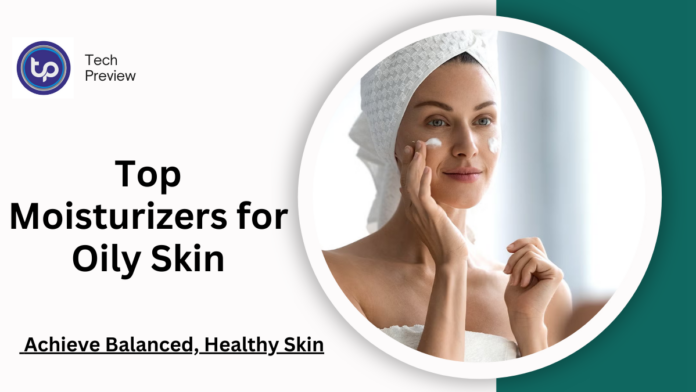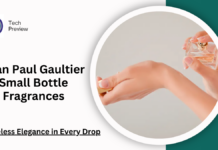Oily skin often comes with a unique set of challenges: excess shine, clogged pores, and the constant battle against acne.
While many individuals with oily skin may be hesitant to use moisturizers, fearing it will make their skin greasier, the truth is that moisturizing is a crucial step in maintaining a healthy and balanced complexion.
In fact, choosing the right moisturizer can help regulate oil production, prevent breakouts, and improve the overall texture of your skin.
This guide will help you understand how to choose the best moisturizer for oily skin, the key ingredients to look for, and how to incorporate it into your skincare routine properly.
What is Oily Skin?
Oily skin is typically the result of excess sebum production by the sebaceous glands, which leads to a shiny or greasy appearance, especially in areas like the forehead, nose, and chin (known as the T-zone).
This overproduction of oil is often triggered by hormonal changes, diet, genetics, and environmental factors. While oil is essential for skin protection, too much can cause problems like clogged pores, acne, and enlarged pores.
MUST READ: Jean Paul Gaultier Small Bottle Fragrances: Timeless Elegance in Every Drop
Characteristics of Oily Skin:
- Shiny skin, particularly in the T-zone.
- Enlarged pores that become more noticeable due to excess oil.
- Acne and blackheads from clogged pores.
- Thick skin texture, which may feel greasy to the touch.
Understanding these characteristics is essential when selecting a moisturizer, as your goal is to hydrate the skin without contributing to more oil production or clogging pores.
ALSO READ: Top Fall Nail Colors & Trends: Perfect Shades for Autumn Manicures
Why Oily Skin Needs Moisturizer
One of the most common misconceptions about oily skin is that it doesn’t require moisturizer. However, skipping moisturizer can lead to imbalances that exacerbate oil production. Here’s why moisturizing is important for oily skin:
1. Regulates Oil Production
When the skin is well-hydrated, it doesn’t feel the need to compensate by producing excess oil. By keeping the skin hydrated, a good moisturizer helps prevent the skin from becoming overly greasy.
2. Prevents Breakouts
Adequate hydration can prevent clogged pores, which is one of the leading causes of acne. A good moisturizer helps maintain the skin’s moisture barrier, which protects against pollutants, dirt, and bacteria that can lead to breakouts.
3. Improves Skin Texture
Hydrated skin is smoother and more even, making it appear less oily and more balanced. It also helps reduce the appearance of enlarged pores and improves overall skin health.
Essential Ingredients for Oily Skin
The key to selecting the right moisturizer for oily skin is understanding which ingredients are beneficial and which ones can make matters worse. Here are some ingredients to look for:
1. Hyaluronic Acid
This ingredient is a moisture-binding powerhouse. Hyaluronic acid attracts water to the skin, providing long-lasting hydration without feeling heavy or greasy.
2. Glycerin
Glycerin is another humectant that draws moisture into the skin. It hydrates without contributing to oiliness, making it ideal for oily skin types.
3. Niacinamide
Niacinamide, or vitamin B3, is renowned for its anti-inflammatory properties. It also helps regulate oil production and reduces the appearance of pores, making it a great choice for those with oily skin.
4. Salicylic Acid
This beta-hydroxy acid (BHA) helps exfoliate the skin, clearing away dead skin cells and preventing clogged pores. It also helps treat and prevent acne by keeping pores clear.
5. Oil-Free or Non-Comedogenic Formulas
Look for moisturizers that are labeled “oil-free” or “non-comedogenic,” which means they won’t clog your pores or add additional oil to the skin.
Choosing the Right Moisturizer for Oily Skin
Not all moisturizers are created equal, and choosing the right type of moisturizer can make a significant difference in your skin’s health. Here’s a breakdown of the best types of moisturizers for oily skin:
1. Gel Moisturizers
Gel-based moisturizers are lightweight and fast-absorbing, making them an excellent choice for oily skin. They provide hydration without the heavy feeling that creams sometimes leave behind.
2. Oil-Free Lotions
Oil-free lotions provide a good balance of hydration without clogging pores. They’re slightly thicker than gels but still lightweight enough for oily skin.
3. Water-Based Moisturizers
Water-based products are often the best for oily skin because they hydrate without introducing oils that may worsen skin concerns. These moisturizers are often refreshing and cooling.
4. Non-Comedogenic Creams
Some lightweight creams are specifically formulated for oily skin. They provide essential moisture while being non-comedogenic, meaning they won’t clog pores or cause breakouts.
How to Apply Moisturizer Effectively
Applying moisturizer correctly can maximize its effectiveness. Follow these tips to get the best results:
- Apply to Damp Skin
For optimal hydration, apply your moisturizer while your skin is still slightly damp after cleansing. This helps lock in moisture and prevents your skin from feeling dry or tight. - Use a Small Amount
A little goes a long way. Apply a pea-sized amount of moisturizer to your face, as using too much can lead to a greasy finish. - Pat, Don’t Rub
Gently pat the product into your skin rather than rubbing it. This will prevent irritation and allow the moisturizer to absorb better. - Consistency Is Key
Use your moisturizer daily, both in the morning and at night, to maintain consistent hydration and keep your skin balanced.
Top 5 Moisturizers for Oily Skin
Here are five highly recommended moisturizers for oily skin that hydrate without making you greasy:
- Neutrogena Hydro Boost Water Gel
This gel-based moisturizer contains hyaluronic acid, which delivers intense hydration while maintaining a lightweight feel. - Clinique Dramatically Different Hydrating Jelly
A fan-favorite, this oil-free formula hydrates without clogging pores or leaving a greasy residue. - La Roche-Posay Effaclar Mat
This moisturizer controls shine and minimizes pores, making it a great option for oily and acne-prone skin. - CeraVe PM Facial Moisturizing Lotion
Packed with niacinamide and ceramides, this moisturizer helps repair the skin barrier while hydrating without oil. - Paula’s Choice Clear Oil-Free Moisturizer
Lightweight and non-comedogenic, this moisturizer is perfect for oily skin types prone to breakouts.
Common Mistakes When Moisturizing Oily Skin
Even with the right moisturizer, there are some common mistakes people with oily skin tend to make. Avoid these pitfalls to keep your skin in top condition:
- Skipping Moisturizer
Many people with oily skin think skipping moisturizer will help with oiliness, but this often leads to more oil production as the skin compensates for dehydration. - Using Heavy, Greasy Creams
Avoid using thick, greasy creams that can clog pores and make the skin feel even oilier. - Over-Application
Applying too much moisturizer can make the skin feel greasy. Stick to a small amount and build up if needed. - Not Adjusting for Weather
During hot, humid weather, switch to a lighter moisturizer. Thicker formulas may feel too heavy in the summer months.
Conclusion
Moisturizing is a crucial step in maintaining the health of oily skin. It hydrates the skin, balances oil production, and improves overall texture.
By choosing the right moisturizer—lightweight, oil-free, and formulated for oily or acne-prone skin—you can ensure your skin stays hydrated without excess shine.
Remember the key ingredients that benefit oily skin and apply your moisturizer correctly for the best results.
People May Ask
1. Can I skip moisturizer if I have oily skin?
No, skipping moisturizer can actually worsen oily skin. When skin is dehydrated, it may produce even more oil to compensate. Use an oil-free, hydrating moisturizer to keep oil production in check.
2. What are the best ingredients for oily skin?
Look for ingredients like hyaluronic acid, niacinamide, glycerin, and salicylic acid. These hydrate the skin, regulate oil production, and prevent breakouts.
3. How do I know if a moisturizer is good for oily skin?
Look for labels that say “oil-free,” “non-comedogenic,” or “lightweight.” These products are specifically formulated to avoid clogging pores and contributing to excess oil.
4. How often should I moisturize oily skin?
Moisturise twice a day—morning and night—after cleansing to keep your skin hydrated and balanced.
Click here to learn more.








